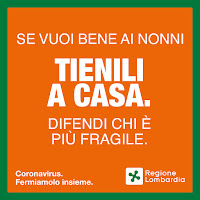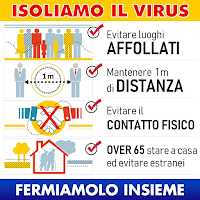previous lesson | this lesson | next lesson
In this post of the Street Sign Language Lesson series, we find ourselves in the middle of the coronavirus pandemic. Here in Italy, and specifically Lombardia, the effect has been devastating.
In the many competing sources of information, the Regione Lombardia - the entity governing the region of Lombardy - has put information to help residents make the right choice and understand their responsibility for keeping the virus at bay. In this post, we'll look at eight of those messages from the point of view of a language lesson. These informational message can be found inTwitter with #fermiaologinsieme and at the Regione web site: https://coronavirus.regione.lombardia.it/.
Se ti vuoi bene, lavati le mani. Piu del solito. Meglio di solito.
"If you love (care about) yourself, wash your hands. More than usual. Better than usual."
Many of the messages in this campaign start with the the se ti vuoi bene - "if you loved yourself" - to drive home the message that's this is a personal fight against the coronavirus. The informal imperative lava plus the reflexive pronoun ti come together as làvati meaning "wash your hands". We added the accent on à to indicate the stress. It's notlavàti.
"If you love (care about) yourself, wash your hands. More than usual. Better than usual."
Many of the messages in this campaign start with the the se ti vuoi bene - "if you loved yourself" - to drive home the message that's this is a personal fight against the coronavirus. The informal imperative lava plus the reflexive pronoun ti come together as làvati meaning "wash your hands". We added the accent on à to indicate the stress. It's not
Se ti vuoi bene, metti la mascherina. Protegge te e gli altri.
"If you love yourself, use a mask. It protects you and others."
We were initially tempted to use the word maschera ("mask") when talking about protection, but it's really mascherina ("half mask") that is more appropriate. Also a little tricky is protegge te, which you might read quickly as protect yourself (following with imperatives that have gone before), but it's really "(the mask) it protects you".
We were initially tempted to use the word maschera ("mask") when talking about protection, but it's really mascherina ("half mask") that is more appropriate. Also a little tricky is protegge te, which you might read quickly as protect yourself (following with imperatives that have gone before), but it's really "(the mask) it protects you".
Se ti vuoi bene, mantieni la distanza. Un metro può bastare.
"If you love yourself, keep your distance. A meter is enough."
Se ti vuoi bene, rimani a casa. Metti il virus alla porta.
"If you love yourself, stay at home. Kick out the virus."
The interesting phrase here is mettere alla porta, which has the idea of keeping away, chasing way, showing the door, or firing. The Italian Wikipedia page of frasi fatti - clichés or platitudes - describes mettere alla porta as allontonare ("push away"), licenziare ("fire, dismiss"), cacciare senza tanti complimenti ("chase away unceremoniously"). All appropriate for the virus.
Se vuoi bene ai nonni, tienili a casa. Difendi chi e più fragile.
"If you love your grandparents, keep them at home. Defend those that are more fragile."
This one pulls at your heartstrings. Think of your grandparents and keep them - masculine plural - at home so you use li, a direct object reference as "them". Tieni is the informal imperative of tenere.
This one pulls at your heartstrings. Think of your grandparents and keep them - masculine plural - at home so you use li, a direct object reference as "them". Tieni is the informal imperative of tenere.
Tutela te, proteggi gli altri
"Protect yourself, protect others."
Tutela is the imperative form of the verb tutelare, to protect or defend. We have the English word tutelage - rarely used - which means the education or protection of someone.
Tutela is the imperative form of the verb tutelare, to protect or defend. We have the English word tutelage - rarely used - which means the education or protection of someone.
Isoliamo il virus. Evitare lughi affollati. Mantenere 1 m di distanza. Evitare il contatto fisico. Over 65 stare a casa ed evitare estranaei
"We isolate the virus by avoiding crowded places, maintaining a distance of 1 meter, avoiding physical contact, and those over 65 stay at home and avoid strangers."
This is a list of things to do to avoid the catching (or spreading) the virus. Since this is a list of instructions, the imperative form using the infinitive form of the verb is use: evitare, mantenere, and stare.
Keep clam and mantieni le distanze. Cornovirus. Fermiamolo insieme
"Keep calm and keep your distances. Coronavirus. We can stop it together."
This message is a take off the British motivational poster during the lead up to World War II, Keep Calm and Carry On. Note that since virus in Italian is masculine, we use the masculine article: "fermiamolo".








No comments:
Post a Comment
All comments are moderated. If your comment doesn't appear right away, it was likely accepted. Check back in a day if you asked a question.